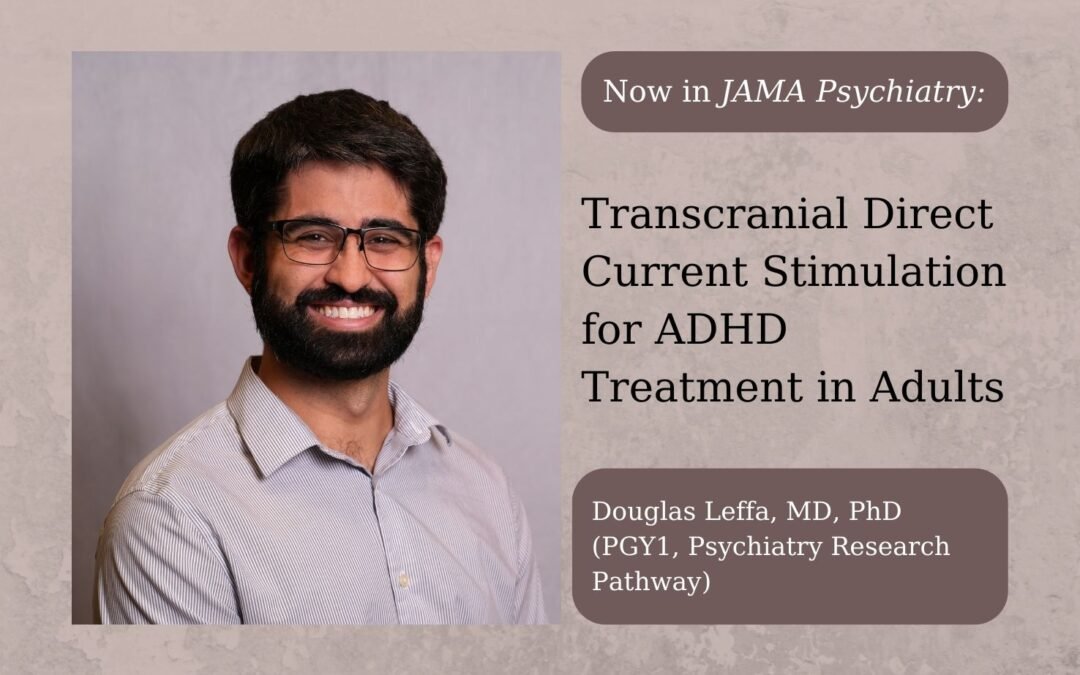Attention-deficit/hyperactivity disorder (ADHD) is a neurodevelopmental condition that affects 2.5% of adults worldwide. Pharmacotherapy is the recommended initial treatment for most adults, but patient adherence can be low due to adverse effects and other concerns. Therefore, the investigation of nonpharmaceutical treatments for ADHD is critical. One option is transcranial direct current stimulation, a noninvasive technique that applies a low intensity current over the scalp to modulate cortical excitability and induce neuroplasticity.
A group of investigators including Pitt scientist Douglas Leffa, MD, PhD (PGY1, Psychiatry Research Pathway), conducted a randomized clinical trial to determine the efficacy and safety of home-based transcranial direct current stimulation in treating inattention symptoms in adults with ADHD. They published the results in JAMA Psychiatry.
The randomized, double-blind, parallel, sham-controlled clinical trial included 64 adult participants with ADHD who were not using stimulant drug treatment. Each individual underwent thirty-minute daily sessions of home-based transcranial direct current stimulation for four weeks. The anodal excitability-increasing electrode was placed over the right dorsolateral prefrontal cortex.
Findings from the study showed that at four weeks of transcranial direct current stimulation treatment, individuals showed a decline in inattention symptoms, indicating that home-based transcranial direct current stimulation could be a nonpharmacological alternative for patients with ADHD.
“This is a very exciting finding in the ADHD literature because it suggests the possibility of a new home-based non-pharmacologic treatment alternative,” said Brooke Molina, PhD (Professor of Psychiatry, Psychology, and Pediatrics), an expert in the course and treatment of ADHD in primary care. “Although the sample size was small in comparison to many treatment trials, it was the largest study of its kind for adults with ADHD and the improvement in inattention symptoms was meaningful. This study nicely sets the stage for continuing this line of research to answer additional questions about transcranial direct current stimulation as a treatment option for individuals with ADHD.”
Psychiatry Research Pathway Director, Danella Hafeman, MD, PhD (Assistant Professor of Psychiatry), said, “Even during his intern year, Dr. Leffa’s groundbreaking work is already making a substantial impact in the field of ADHD research. I look forward to watching his progress over the next several years, as he makes use of clinical and research training to build on this exciting work. He is certainly a rising star!”
Transcranial Direct Current Stimulation vs Sham for the Treatment of Inattention in Adults with Attention-Deficit/Hyperactivity Disorder: The TUNED Randomized Clinical Trial
Leffa DT, Grevet EH, Bau CHD, Schneider M, Ferrazza CP, da Silva RF, Miranda MS, Picon F, Teche SP, Sanches P, Pereira D, Rubia K, Brunoni AR, Camprodon JA, Caumo W, Rohde LA
JAMA Psychiatry, September 1, 2022, https://doi.org/10.1001/jamapsychiatry.2022.2055
Link:

